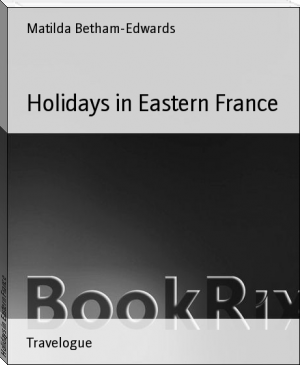East of Paris - Matilda Betham-Edwards (english readers .TXT) 📗

- Author: Matilda Betham-Edwards
Book online «East of Paris - Matilda Betham-Edwards (english readers .TXT) 📗». Author Matilda Betham-Edwards
"You ladies would perhaps like to make a little journey with me?" she asked, "nothing easier, we start to-morrow morning at six o'clock for Nevers, you could take the train back."
Never perhaps in our lives had myself and my companion received an invitation so out of the way, so bewilderingly tempting! And we felt too, with a pang, that never again in all probability should we receive such another. But on this especial day we were not staying at Moret, only running over for the afternoon from our headquarters at Bourron. Acceptance was thus hemmed round with small impediments. And by way of consolation, next morning the glorious weather broke. A downpour recalling our own lakeland would anyhow have kept us ashore.
"Another time then!" had said the kind hostess of the barge at parting. She seemed as sorry as ourselves that the little project she had mooted so cordially could not be carried out.
The Loing canal joins the Seine at Saint Mammes, a few kilometres lower down, continuing its course of thirty kilometres to Bleneau in the Nievre. Canal life in Eastern France is a characteristic feature, the whole region being intersected by a network of waterways, those _chemins qui marchent_, or walking roads as Michelet picturesquely calls them. And strolling on the banks of the canal here you may be startled by an astonishing sight, you see folks walking, or apparently walking, on water. Standing bolt upright on a tiny raft, carefully maintaining their balance, country people are towed from one side to the other.
These suburban and riverside quarters are full of charm. The soft reds and browns of the houses, the old-world architecture and romantic sites, tempt an artist at every turn. And all in love with a Venetian existence may here find it nearer home.
A few villas let furnished during the summer months have little lawns winding down to the water's edge and a boat moored alongside. Thus their happy inmates can spend hot, lazy days on the river.
Turning our backs on the canal, by way of ivy-mantled walls, ancient mills and tumbledown houses, we reach the Porte du Pont or Gate of the Bridge. With other towns of the period, Moret was fortified. The girdle of walls is broken and dilapidated, whilst firm as when erected in the fourteenth century still stand the city gates.
Of the two the Porte du Pont is the least imposing and ornamental, but it possesses a horrifying interest. In an upper storey is preserved one of those man-cages said to have been invented for the gratification of Louis XI, that strange tyrant to whose ears were equally acceptable the shrieks of his tortured victims and the apt repartee of ready-witted subjects.
"How much do you earn a day?" he once asked a little scullion, as incognito he entered the royal kitchen.
"By God's grace as much as the King," replied the lad; "I earn my bread and he can do no more."
So pleased was the King with this saying that it made the speaker's fortune.
We climb two flights of dark, narrow stone stairs reaching a bare chamber having small apertures, enlargements of the mere slits formerly admitting light and air. The man-cage occupies one corner. It is made of stout oaken ribs strongly bound together with iron, its proportions just allowing the captive to lie down at full length and take a turn of two or three steps. De Commines tells us that the cage invented by Cardinal Balue, and in which he languished for eleven years, was narrower still. An average sized man could not stand therein upright.
The bolts and bars are still in perfect order. Nothing more brings home to us the abomination of the whole thing than to see the official draw these Brobdingnagian bolts and turn these gigantic keys. The locksmith's art was but too well understood in those days. By whom and for whom this living tomb was made or brought hither local records do not say.
From a stage higher up a magnificent panorama is obtained, Moret, old and new, set round with the green and the blue, its greenery and bright river, far away its noble aqueduct, further still looking eastward the valley of the Loing spread out as a map, the dark ramparts of Fontainebleau forest half framing the scene.
The town itself is a trifle unsavoury and unswept. Municipal authorities seem particularly stingy in the matter of brooms, brushes and water-carts. Such little disagreeables must not prevent the traveller from exploring every corner. But the real, the primary attraction of Moret lies less in its historic monuments and antiquated streets than in its _chemins qui marchent_, its ever reposeful water-ways. Like most French towns Moret is linked with English history. Its fine old church was consecrated by Thomas a-Becket in 1166. Three hundred years later the town was taken by Henry V., and re-taken by Charles VII. a decade after. Not long since five hundred skulls supposed to have been those of English prisoners were unearthed here; as they were all found massed together, the theory is that the entire number had surrendered and been summarily decapitated, methods of warfare that have apparently found advocates in our own day.
Most visitors to Paris will have had pointed out to them the so-called "Maison Francois Premier" on the Cour La Reine. This richly ornate and graceful specimen of Renaissance architecture formerly stood at Moret, and bit by bit was removed to the capital in 1820. A spiral stone staircase and several fragments of heraldic sculpture were left behind. Badly placed as the house was here, it seems a thousand pities that Moret should have thus been robbed of an architectural gem Paris could well have spared.
My first stay at Moret three years ago lasted several weeks. I had joined friends occupying a pretty little furnished house belonging to the officiating Mayor. We lived after simplest fashion but to our hearts' content. One of those indescribably obliging women of all work, came every day to cook, clean and wait on us. Most of our meals were taken among our flower beds and raspberry bushes. The only drawback to enjoyment may at first sight appear unworthy of mention, but it was not so. We had no latchkey. Now as every-one of all work knows, they are constantly popping in and out of doors, one moment they are off to market, the next to warm up their husbands' soup, and so on and so on. As for ourselves, were we not at Moret on purpose to be perpetually running about also? Thus it happened that somebody or other was always being locked out or locked in; either Monsieur finding the household abroad had pocketed the key and instead of returning in ten minutes' time had lighted upon a subject he must absolutely sketch then and there; or Madame could not get through her shopping as expeditiously as she had hoped; or their guest returned from her walk long before she was due; what with one miscalculation and another, now one of us had to knock at a neighbour's door, now another effected an entrance by means of a ladder, and now the key would be wholly missing and for the time being we were roofless, as if burnt out of house and home. Sometimes we were locked in, sometimes we were locked out, a current "Open Sesame" we never had.
But no "regrettable incidents" marred a delightful holiday. Imbroglios such as these only leave memories to smile at, and add zest to recollection.
CHAPTER III.
BOURRON.
Two years ago some Anglo-French friends joyfully announced their acquisition of a delightful little property adjoining Fontainebleau forest. "Come and see for yourself," they wrote, "we are sure that you will be charmed with our purchase!" A little later I journeyed to Bourron, half an hour from Moret on the Bourbonnais line, on arriving hardly less disconcerted than Mrs. Primrose by the gross of green spectacles. No trim, green verandahed villa, no inviting vine-trellised walk, no luxuriant vegetable garden or brilliant flower beds greeted my eyes; instead, dilapidated walls, abutting on these a peasant's cottage, and in front an acre or two of bare dusty field! My friends had indeed become the owners of a dismantled bakery and its appurtenances, to the uninitiated as unpromising a domain as could well be imagined. But I discovered that the purchasers were wiser in their generation than myself. Noticing my crestfallen look they had said:--
"Only wait till next year, and you will see what a bargain we have made. You will find us admirably housed and feasting on peaches and grapes."
True enough, twelve months later, I found a wonderful transformation. That a substantial dwelling now occupied the site of the dismantled bakery was no matter for surprise, the change out of doors seemed magical. Nothing could have looked more unpromising than that stretch of field, a mere bit of waste, your feet sinking into the sand as if you were crossing the desert. Now, the longed-for _tonnelle_ or vine-covered way offered shade, petunias made a splendid show, choice roses scented the air, whilst the fruit and vegetables would have done credit to a market-gardener. Peaches and grapes ripened on the wall, big turnips and tomatoes brilliant as vermilion took care of themselves. It was not only a case of the wilderness made to blossom as the rose, but of the horn of plenty filled to overflowing, prize flowers, fruit and vegetables everywhere. For the soil hereabouts, if indeed soil it can be called, and the climate of Bourron, possess very rare and specific qualities. On this light, dry sand, or dust covering a substratum of rock, vegetation springs up all but unbidden, and when once above ground literally takes care of itself. As to climate, its excellence may be summed up in the epithet, anti-asthmatic. Although we are on the very hem of forty thousand acres of forest, the atmosphere is one of extraordinary dryness. Rain may fall in torrents throughout an entire day. The sandy soil is so thorough an absorbent that next morning the air will be as dry as usual.
This house reminded me of a tiny side door opening into some vast cathedral. We cross the threshold and find ourselves at once in the forest, in close proximity moreover to its least-known but not least majestic sites. We may turn either to right or left, gradually climbing a densely wooded headland. The first ascent lands us in an hour on the Redoute de Bourron, the second, occupying only half the time, on a spur of the forest offering a less famous but hardly less magnificent perspective, nothing to mar the picture as a whole, sunny plain, winding river and scattered townlings looking much as they must have done to Balzac when passing through three-quarters of a century ago.
This eastern verge of the Fontainebleau forest is





Comments (0)